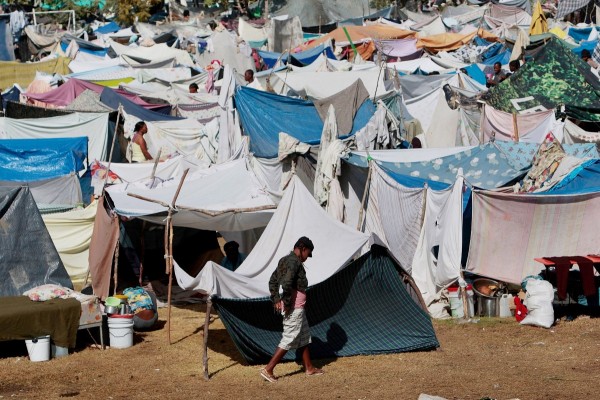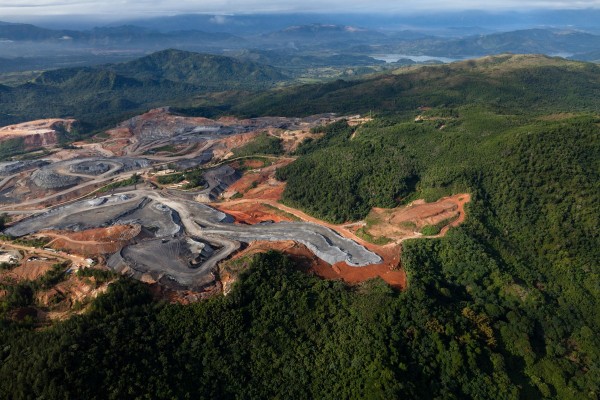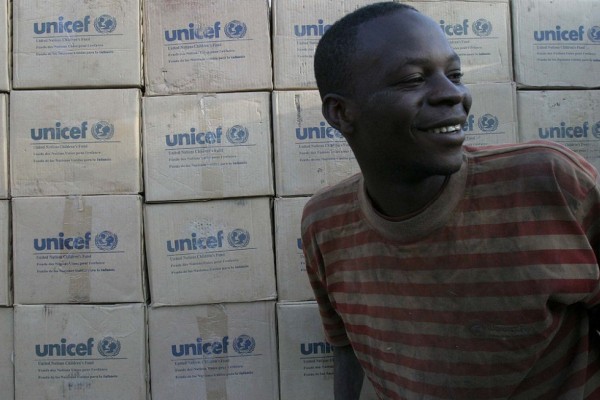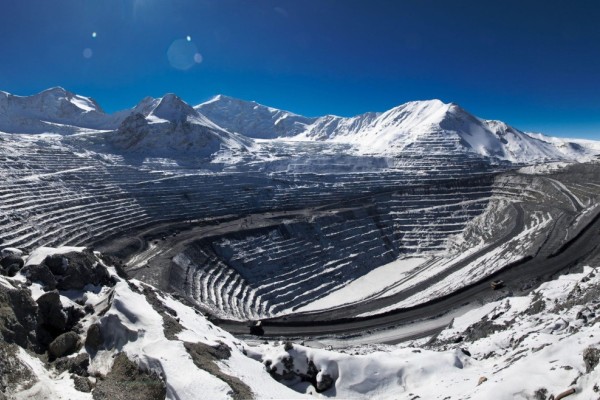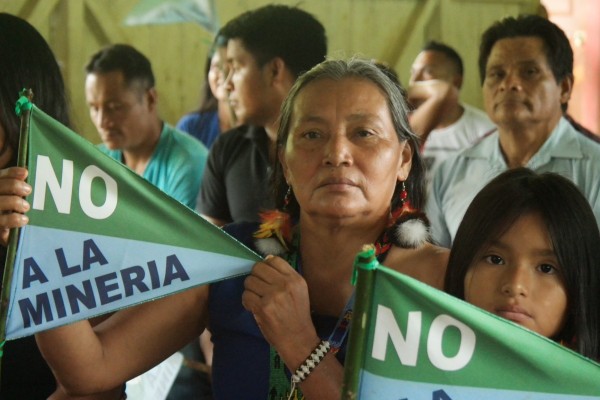As West African states take greater role in mining sector, how will Canada respond?
Last month, Mali adopted a new mining code that will allow the state to collect more revenues from the vital industry

Illegal gold mining in Ghana. Photo by Randy Olson.
Canadian mining companies are some of the largest investors in West African gold. Every year, these firms generate billions in revenue from countries like Burkina Faso, Mali, and Ghana, while local populations struggle in poverty and underdevelopment.
The destruction of pan-Africanist, socialist models of development in the region was a stated goal of Canada and its allies throughout the 20th century. When Ghana’s socialist President Kwame Nkrumah was overthrown in a CIA-backed coup in 1966, the Canadian High Commissioner in Accra, C.E. McGaughey, described Nkrumah’s removal as “a wonderful thing…for the West” in which Canada “played a worthy part”—namely, the training of the coup perpetrators in a Canada-run program at the Ghanaian Defence College.
In the decades following Nkrumah’s ouster, Canadian mining companies poured into Ghana, whose economy had been liberalized according to the dictates of the International Monetary Fund (IMF). Subsequently, benefits flowed to foreign investors while the Ghanaian economy floundered. And Canadian investment exploded:
[They] grew in combination with the country’s liberalization, especially in the mining sector. Gold is the country’s most profitable export, and by 2005, 11 major Canadian mining companies operated there: Birim Goldfields, Nevsun Resources, Moydow Mines International, St. Jude Resources, PMI Ventures, AMI Resources, AXMIN, Alcan, IAMGOLD, Golden Star Resources, and Akrokeri-Ashanti Gold Mines. This massive resource wealth does not translate to profits for the people of Ghana. In fact, the modern Ghanaian state is a model of Western-backed liberalization in West Africa, allowing foreign companies to repatriate up to 95 percent of their profits from the mining industry.
A similar situation prevailed following the French-backed coup against Burkina Faso’s socialist President Thomas Sankara in 1987. As with Ghana, the Western-supported coup government adopted IMF structural adjustment programs. As a result, Canadian mining companies began to buy up Burkinabè mineral reserves.
Canadian companies now own $2.5 billion of Burkina Faso’s gold resources. These companies have been plagued by scandal. In April 2022, a mine owned by the Vancouver-based Trevali Mining Corporation flooded, causing the deaths of eight employees. Two executives have since been convicted of involuntary manslaughter for not investing in backup systems that would have prevented the tragic loss of life.
Another Canadian company, Semafo, was notorious in West Africa for its corruption and abusive labour practices: “Semafo in particular was known for its egregious practices across West Africa: it was very close with the Compaoré regime [in Burkina Faso], engaging in violent strike-breaking in Niger, while evading nearly $10 million in taxes in Guinea.” In 2020, Semafo was acquired by another Canadian company, Endeavour Mining.
In Mali, too, Canada has enormous mining interests. Like Ghana and Burkina Faso, the external influence of Western states and financial institutions have opened up Mali’s resources to transnational investors on extremely generous terms:
Canada’s clearest connection to Mali is through gold mining. The country is the fourth largest source of gold in Africa, and several Canadian gold mining companies operate large mines there, with Barrick Gold being the biggest… Royalty rates (percentages of mining revenues to be paid to the government) were originally set at a low rate in 1999 with assistance from the World Bank and have remained low. This means much of the value of the extracted gold goes to the foreign companies, not the Malian people or government. Still, mining makes up 30% of the government’s tax revenues, according to the World Bank.
For over a decade, countries in West Africa have been severely destabilized by militant Islamist uprisings. These insurgent forces largely spun off from the Western-backed militias in Libya who helped overthrow and murder Muammar Qadhafi in 2011. In Mali, these forces allied themselves with the Tuareg, a distinct ethnic group fighting for independence from the Malian government. The fighting in Mali quickly spilled over into Burkina Faso, where Maghrebi jihadist groups have overrun roughly 40 percent of the nation’s territory, and into Niger.
In this context, a number of military coups have occurred in West Africa in recent years: in Guineau, Mali, Burkina Faso, and most recently Niger. Unlike previous coups, these military takeovers are anti-Western in character and infused with searing anti-colonial rhetoric. The neocolonial grip of France, embodied in a system of economic domination known as Françafrique, has been decidedly refuted. Meanwhile, the US has seen its influence wane as the region’s military leaders look for alternative military partners (namely Russia) who may be more effective at crushing the insurgencies.
Dr. Arikana Chihombori-Quao, the former representative of the African Union to the United States, has stated: “What’s happening now in Africa is a revolution… There’s no way the West would have continued to plunder Africa’s natural resources, abuse the Africans for as long as they have… This just the beginning of the African revolution and it is not going to stop.”
Thus far, the “revolution” in West Africa seems to be targeting the military rather than the economic influence of the West, restricting Western military forces and opening the door to collaboration with other powers. Anti-imperialist rhetoric suffuses statements from the military governments, but at the economic level, it has been unclear what changes the new leaders plan to implement.
Despite the bloody fighting in the region, Canadian companies have remained invested in West African minerals. Military coups have not fundamentally altered the neoliberal policies that were imposed from the 1980s onward, meaning that Canadian miners are still able to extract massive profits from the warring region. However, recent moves by the governments of Mali and Burkina Faso may give Canadian companies, and by extension the Canadian government, cause to fret.
This August, the Malian government adopted a new mining code that increases the state’s role in the sector. The details are as follows:
The new code now allows the government to take a 10% stake in mining projects and the option [for the state] to buy an additional 20% within the first two years of commercial production… A further 5% stake could be ceded to locals, taking state and private Malian interests in new projects to 35%, from up to 20% today… Meanwhile certain tax exemptions have been abolished…
According to Economy Minister Alousseni Sanou and Mines Minister Amadou Keita, “the approved code [will] generate an additional 500 billion CFA francs ($803 million) per year for the state and increase the mining sector’s contribution to the economy by up to 20% of gross domestic product, from the current 9%.” A separate bill “would ensure miners employ more locals to top positions, transfer skills and technology, and place a cap on expatriate salary costs.”
In response to the news about Mali’s mining reforms, a spokesperson for Canadian mining giant Barrick Gold (one of the largest Canadian miners in the country alongside B2Gold) noted that the new law represents a “difference of opinion” between the company and the government. The spokesperson said, “As in any generation-long relationship, there have been occasional differences of opinion between the partners, but these have always been resolved through constructive dialogue.”
West Africa analyst Mucahid Durmaz predicted more “regulatory uncertainty” in Mali going forward: “As the junta needs to boost state revenues, the change will likely encourage more state interventions such as demands for renegotiating mining contracts, introducing additional taxes, and temporary suspensions of mining projects.” He added:
[The laws] will likely discourage existing operators from developing new projects, deter foreign miners from investing in Mali… There is a risk the new mining law is the thin end of the wedge. Miners will be concerned about the potential for further demands down the line, such as re-negotiating existing contracts.
Canadian Dimension readers are well aware of how Ottawa responds to such efforts, but Canada’s ongoing attempt to overturn Mexican President Andrés Manuel López Obrador’s mining reforms offer a good example.
Nevertheless, Canadian mining companies with major investments in Mali have not spoken openly against the reforms. B2Gold CEO Clive Johnson has said, “There [are] a lot of discussions going on which is very healthy and we are confident we can find common ground going forward.” Meanwhile, Barrick CEO Mark Bristow revealed that he has personally engaged with the Malian government on the mining code. “We are optimistic,” he said, “that, as in the past, we will find a mutually acceptable way to keep gold shining for Mali.”
In February 2023, Ibrahim Traoré’s government in Burkina Faso announced efforts to process more of the country’s gold locally. That same month, Traoré said that a review of Burkina Faso’s mining code would happen soon. More recently, Traoré told a crowd gathered for International Youth Day that he would reclaim the country’s artisanal mining sites and also “force the hand of the country’s major economic operators…to create initiatives for young people.” He added: “The time has come for us to wake up and not be driven to cross the ocean, to die in search of the much-touted ‘El Dorado.’ We can create it here.”
As of yet, the Trudeau government has been quiet about the mining reforms in West Africa. But history shows that Ottawa can react aggressively to interventions which curtail the ability of domestic firms to profit abroad. For this reason, we should watch the ongoing discussions around mining in West Africa closely.
Owen Schalk is a writer from rural Manitoba. He is the author of Canada in Afghanistan: A story of military, diplomatic, political and media failure, 2003-2023.





